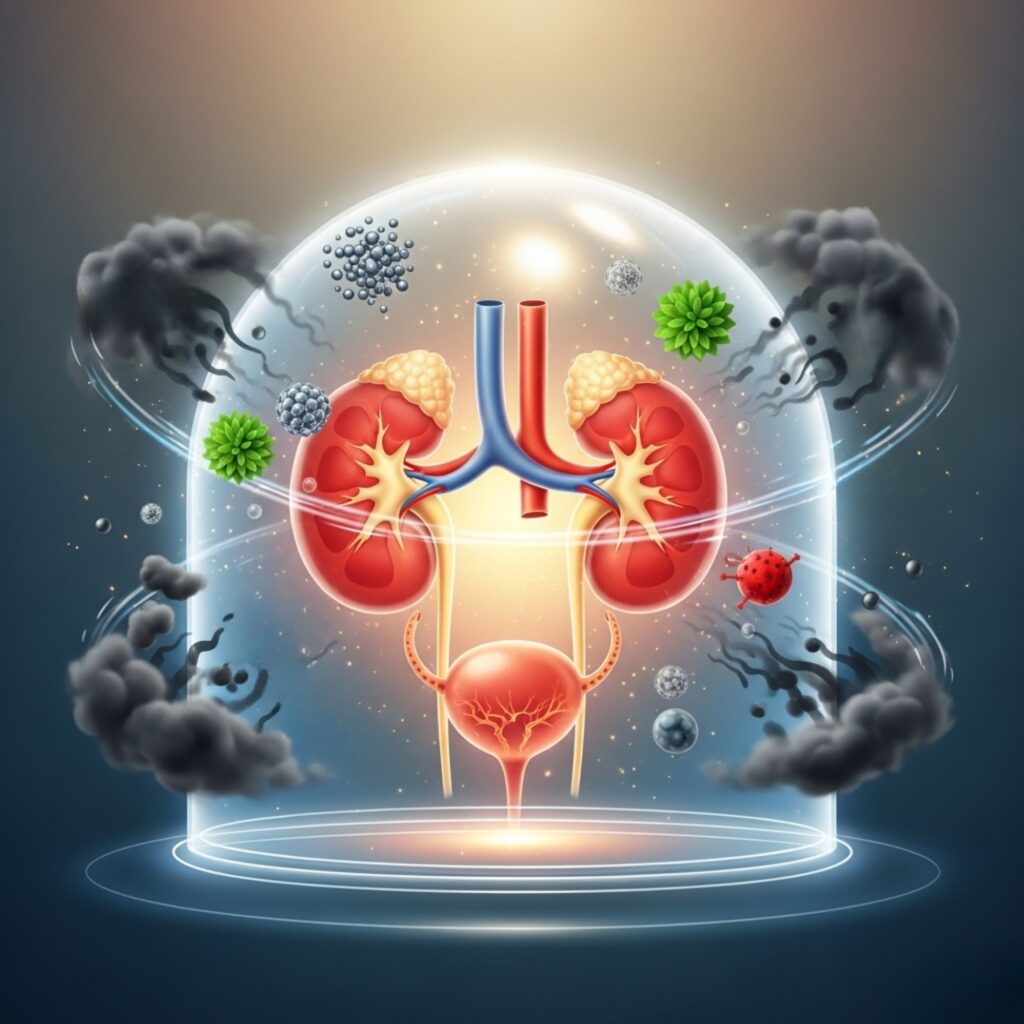We often think of our kidneys and bladder as a simple filtration system, a behind-the-scenes team that keeps our body clean. But in our modern world, this system is under constant assault from an invisible enemy: environmental toxins. These aren’t just industrial pollutants; they’re in the air we breathe, the water we drink, and the food we eat. Understanding these external factors is the first step in protecting these vital organs.
The Kidney: Your Body’s Master Filter
The kidneys are remarkable organs. They filter about 180 liters of blood a day, removing waste products and extra fluid. This concentrating function, however, also makes them a prime target for toxins. When harmful substances enter your bloodstream, the kidneys are tasked with filtering them out, making their cells highly vulnerable to damage.
Common Culprits:
- Heavy Metals: Lead, mercury, and cadmium are some of the most well-known offenders. Sources can include old lead pipes in plumbing, contaminated fish, and certain industrial exposures. Chronic exposure can lead to acute kidney injury or long-term chronic kidney disease (CKD).
- Pesticides and Herbicides: Found in our food supply and used in agriculture, these chemicals have been linked to higher rates of CKD, particularly in farm workers with heavy exposure.
- Air Pollution: Research suggests that fine particulate matter from air pollution can enter the bloodstream through the lungs, get filtered by the kidneys, and cause damage, increasing the risk of new kidney disease cases and accelerating the progression of CKD.
- Aristolochic Acid: Found in certain herbal supplements, this compound is a potent nephrotoxin and a known cause of a severe form of chronic kidney disease and urinary tract cancers.
The Bladder: A Storage Tank Under Threat
While the kidneys filter toxins, the bladder holds the waste until it’s eliminated. This means the bladder wall is exposed to a concentrated mixture of these same toxins over time, increasing the risk of damage, irritation, and even cancer.
The Main Offenders:
- Smoking: While often associated with lung cancer, smoking is a leading cause of bladder cancer. The chemicals from tobacco smoke are absorbed into the bloodstream, filtered by the kidneys, and accumulate in the urine, exposing the bladder to these carcinogens.
- Industrial Chemicals: Workers in industries that use certain aromatic amines, such as those involved in making dyes, rubber, textiles, or paint, have a higher risk of bladder cancer.
- Arsenic: Naturally occurring in some groundwater and used in certain pesticides, arsenic in drinking water is classified as a known cause of bladder cancer.
- PFAS (Forever Chemicals): These widely used man-made chemicals, found in a variety of industrial and consumer products, have been linked to an increased risk of bladder cancer.
How to Protect Your Kidneys and Bladder
The good news is that there are proactive steps you can take to minimize your exposure and support the health of your urinary system.
- Hydrate, Hydrate, Hydrate: Drinking plenty of water is one of the simplest and most effective ways to protect your urinary system. It helps flush out toxins, preventing them from building up and causing damage.
- Filter Your Water: If you have a private well or are concerned about contaminants in your public water supply, consider a water filtration system that removes heavy metals, pesticides, and other chemicals.
- Choose Your Food Wisely: Eating an organic diet has been shown to significantly reduce pesticide levels in the body. Washing all produce thoroughly is also a good practice.
- Quit Smoking: If you are a smoker, quitting is the single most impactful action you can take to reduce your risk of bladder cancer and a host of other health problems.
- Be Mindful of Your Environment: Use personal protective equipment if you work in an industry with chemical exposure. At home, be aware of the chemicals in cleaning products, paints, and other household items.
- Don’t Hold It In: Urinate when you feel the urge. Holding urine for extended periods allows toxins to sit in your bladder, increasing the risk of irritation and other issues.
- Know Your Body and Talk to Your Urologist: Be aware of the signs of urinary system issues, such as blood in your urine, frequent urination, or pain. If you have concerns, especially regarding your occupational or environmental exposures, discuss them with your healthcare provider.
Our kidneys and bladder are remarkable in their ability to protect us, but they can’t do it alone. By being mindful of the external factors that challenge their function and by adopting these protective habits, you can play an active role in safeguarding your long-term urinary health.

